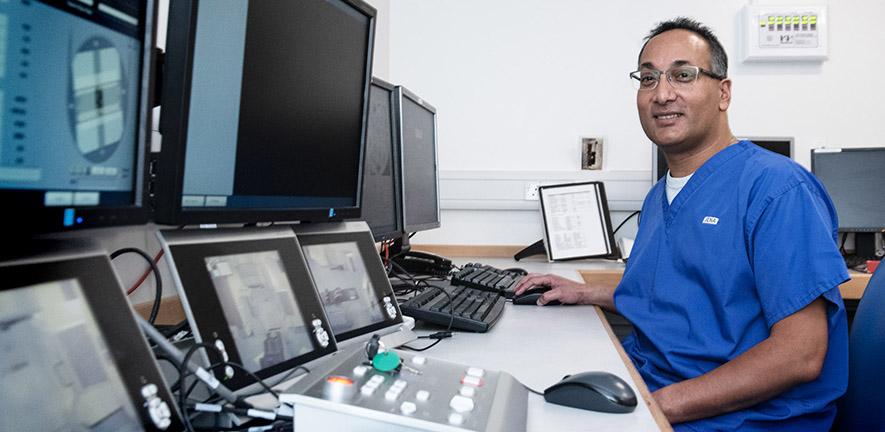AI Revolutionizes Radiotherapy for Cancer Patients in NHS Breakthrough

In a significant leap forward for cancer treatment within the NHS, artificial intelligence (AI) at Addenbrooke’s Hospital in Cambridge is dramatically reducing the wait times for radiotherapy for cancer patients. The innovative AI technology, named ‘OSAIRIS’, is streamlining the preparation of scans, saving countless hours of medical professionals’ time and significantly shortening the gap between referral and the commencement of radiotherapy treatments.
Developed through a collaborative effort between the NHS and the University of Cambridge, alongside long-term research partnerships with Microsoft Research, OSAIRIS is enhancing the efficiency of treatment planning. Specialists, working with OSAIRIS, can now design radiotherapy treatments approximately 2.5 times faster than traditional methods, allowing for quicker treatment initiation and improving patient outcomes.
Currently, OSAIRIS is being employed in the treatment of prostate and head and neck cancers at Addenbrooke’s. However, its potential application across a myriad of cancer types promises widespread benefits for patients throughout the NHS network.
Dr Raj Jena, an oncologist at Cambridge University Hospitals NHS Foundation Trust, has been at the forefront of this AI research. His work includes significant collaborations on Project InnerEye with Microsoft Research, aiming to leverage machine learning for the global medical imaging community. To further this field, Microsoft Research has made Project InnerEye toolkits available as open-source software, encouraging broader research participation.
With the support of a £500,000 NHS AI Lab grant, Dr Jena’s team developed OSAIRIS, utilizing the open-source software from Project InnerEye and patient data from those who consented to contribute to this groundbreaking research.
OSAIRIS is streamlining one of the most time-intensive aspects of radiotherapy preparation: the segmentation of healthy organs on scans to safeguard them from radiation. Traditionally requiring up to three hours per patient, OSAIRIS accomplishes this task with remarkable speed and accuracy, leaving oncologists to fine-tune and verify the results.
Extensive testing and risk assessments have confirmed OSAIRIS’s safety for routine clinical use. In ‘Turing tests’, where doctors evaluated the AI’s segmentation work without knowing its origin, they found it indistinguishable from that of their human colleagues.
Dr Jena highlights the transformative nature of OSAIRIS as the first cloud-based AI technology developed and deployed within the NHS. After rigorous 18-month testing, plans are underway to extend this technology’s benefits across the NHS, promising enhanced care for patients with lung, breast, and brain cancers.
Aditya Nori, General Manager of Healthcare for Microsoft Research, and Health and Social Care Secretary Steve Barclay have both praised the integration of AI in healthcare. They underscore the potential for AI to not only alleviate the workload on clinicians but also to elevate patient safety, outcomes, and experiences significantly.
As the NHS celebrates its 75th anniversary, investments such as OSAIRIS mark a commitment to the future of healthcare, leveraging AI to expedite diagnoses and treatments across a range of conditions, ultimately saving lives and reducing waiting lists in line with government priorities.











